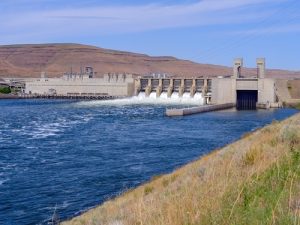
Several Republican congressional members on June 9 proposed a bill that would help protect the four lower Snake River dams — Ice Harbor, Lower Monumental, Little Goose, and Lower Granite — which are part of the Federal Columbia River Power System (FCRPS), the largest source of clean, renewable electricity in the Pacific Northwest helping the region limit its greenhouse gas emissions.
“In the Pacific Northwest, not only do we depend on this critical infrastructure for clean, renewable, and affordable energy, but transportation for 60 percent of the nation’s wheat,” bill sponsor U.S. Rep. Dan Newhouse (R-WA) said. “The Snake River dams are integral to flood control, navigation, irrigation, agriculture, and recreation in central Washington and our region cannot afford to lose them.
“This legislation utilizes the best available science to further ensure the lower Snake River dams continue to provide carbon-free, baseload energy while continuing to support fish recovery efforts,” he added.
Rep. Newhouse on June 9 introduced the Federal Columbia River Power System Certainty Act, H.R. 8016, with 10 original GOP cosponsors, including U.S. Reps. Cathy McMorris Rodgers (R-WA), Jaime Herrera Beutler (R-WA), Pete Stauber (R-MN), and Mariannette Miller-Meeks (R-IA).
If enacted, H.R. 8016 aims to improve and maintain hydropower assets by ensuring operations throughout the FCRPS are conducted in accordance with the latest federal scientific review, and continuing to allow native salmon to recover, according to a bill summary provided by the lawmakers.
“The science is crystal clear: breaching the four lower Snake River dams would be harmful to our communities, our environment, and our economy,” said Rep. Newhouse. “Amidst a national energy and supply chain crisis, it is unconscionable that dam-breaching advocates — including Governor Inslee and Senator Murray — repeatedly attempt to force a predetermined, unscientific conclusion that will put our communities who are already struggling at risk.”
Rep. McMorris Rodgers pointed out that calling for the removal of the four lower Snake River dams after three straight years of improved salmon returns is misguided.
“What’s alarming is trying to breach them at a time when families in eastern Washington are paying record-high energy costs just to keep the lights on this summer,” said Rep. McMorris Rodgers. “We know that salmon can and do co-exist, and it’s time we focus on results.”
Citing conclusions in the 2020 Environmental Impact Statement, Rep. Herrera Beutler said it’s possible to balance the health of the region’s native fish runs while also protecting the clean, affordable hydropower and many economic benefits provided by these dams. “I’m pleased to lend my support to this legislation, which ensures we’re relying on science to manage our river systems to benefit our precious salmon species and our residents,” she said.
Rep. Stauber noted that the dams in the Pacific Northwest are necessary for modern life, and breaching the FCRPS would set the region back centuries.
“They provide clean baseload power and create world class agriculture, recreation and other opportunities,” said Rep. Stauber, who added that he’s proud to stand with Western Caucus Chairman Newhouse in defending his constituents’ way of life and preserving “these incredible feats of modern engineering.”
“It was extremely clear during our tour of the Ice Harbor Dam and the Columbia and Snake Rivers last week with Representative Newhouse that hydropower must play a crucial role in our all of the above energy approach,” said Rep. Miller-Meeks. “I am proud to join in introducing this important legislation that will ensure that hydroelectric dams in the Columbia River system are able to continue providing energy and supporting the transportation, agriculture, and irrigation sectors that all Americans rely on.”
H.R. 8016 has been endorsed by the Inland Ports and Navigation Group, the Tri-Cities Development Council, the United Power Trades Organization, Washington Wheat Growers, the Washington Grain Commission, the Washington Farm Bureau, and the Idaho Farm Bureau.



